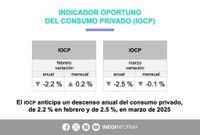The Mexican economy is facing a troubling downturn as the latest data from the National Institute of Statistics and Geography (INEGI) reveals a significant decline in private consumption, a key driver of economic activity. The Opportunity Indicator of Private Consumption (IOCP) indicates that household spending has weakened considerably, raising concerns about the potential onset of a recession.
According to INEGI, the IOCP forecasts a slight increase of 0.2% in private consumption for February 2025, but this is followed by a predicted decrease of 0.1% in March 2025. Furthermore, the annual figures are even more alarming, with a projected decline of 2.2% in February and 2.5% in March compared to the same months in the previous year. This downward trend reflects a growing caution among Mexican consumers, who are tightening their belts amid rising inflation and economic uncertainty.
Gabriela Gutiérrez, president of the Mexican Institute of Finance Executives (IMEF), emphasized the seriousness of the situation, stating, "The ghost of recession looms strongly in the Mexican economy." She pointed out that two of the three necessary conditions for a recession—depth and duration—are currently being met. Gutiérrez noted that the contraction in private consumption, which constitutes about two-thirds of the Gross Domestic Product (GDP), is indicative of a broader economic malaise.
The IOCP serves as an early estimate of the Monthly Indicator of Private Consumption (IMCP), providing crucial insights into consumer behavior and spending patterns. The data shows that since December 2024, the IOCP has recorded four consecutive months of negative growth, with declines of 0.94% in December, 0.90% in January, and 2.17% in February. March's anticipated drop of 2.55% marks the most significant contraction since February 2021, when the economy was still reeling from the impacts of the COVID-19 pandemic.
Analysts have attributed this downturn to a combination of factors, including rising inflation and the uncertainty surrounding U.S. trade policies. The recent tariff plan proposed by the United States has added to the economic anxiety, with UBS estimating that the damage to global growth has already been done, even with a temporary pause on the tariffs. The financial institution warned that the ongoing uncertainty could further hinder economic activity, negatively impacting consumption of goods and services.
Fitch Ratings and the Organization for Economic Cooperation and Development (OECD) have also projected that Mexico could slip into recession as a result of the tariff plan initiated by former President Donald Trump. The IMEF has subsequently revised its GDP growth forecast for 2025 from 0.6% to a mere 0.2%, indicating a bleak outlook for the upcoming year.
The implications of these trends are far-reaching. A decrease in consumer spending not only affects businesses but also has a direct impact on employment and investment. As households become more cautious with their finances, there is a marked decline in the use of credit cards and an increase in saving behaviors. Many families are adjusting their spending habits in response to the precarious labor market and the lack of job opportunities in various regions.
In light of these developments, the IMEF's assessment on April 15, 2025, underscores the urgency of the situation. Gutiérrez stated, "The economy of Mexico is heading into a recession," highlighting the interconnectedness of economic indicators and the need for comprehensive policy responses to mitigate the impending downturn.
As the economic landscape continues to evolve, the upcoming release of the final data for February's private consumption indicator on May 6, 2025, will be closely monitored by economists and policymakers alike. This data will provide a clearer picture of the trajectory of consumer spending and its implications for the broader economy.
Overall, the current economic indicators suggest a period of contraction that could have lasting effects on the Mexican economy. The combination of declining consumer confidence, rising inflation, and external economic pressures creates a challenging environment for households and businesses alike. As the situation unfolds, the focus will be on how effectively the government and financial institutions can respond to these challenges and restore confidence in the economy.








